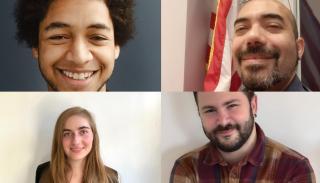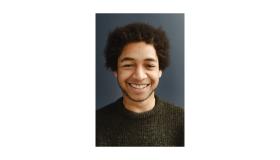Meet the new Postgraduate Network (PGN) committee

We're delighted to introduce you to the new PGN committee for the next academic year.
We welcome back former Communications Officer, Konstantinos Manakos, as the new Chair. We also welcome new committee members Iris Magne - Vice Chair, David Cardillo - Communications Officer and CJ Simon - Events and Elections Officer. You can find out more about them below.
Last, but not least, we thank outgoing Chair, Assala Khettache, for her hard work.
Konstantinos Manakos - Chair

Konstantinos is a third-year PhD student in International Relations at Northumbria University, where he focuses on the socio-political implications of emerging digital technologies. His doctoral research specifically examines the EU’s Digital Sovereignty Initiative, analysing its impact on the EU, its Member States, and the broader international community. He has also held a visiting research position at the Brussels School of Governance.
Before starting his PhD, Konstantinos worked as a field-research manager and supervisor at the Hellenic National Centre of Social Research. He has contributed to various national and EU-funded research projects. In regards to his academic background, he holds a BA in Political Science and Law from the University of Mannheim, complemented by two MA degrees: one in Governance and International Relations from Aston University, and another in Governance of Complex Technical Systems from Bamberg University.
Iris Magne - Vice Chair

Iris is a PhD Candidate in Russian and Eurasian Studies at King’s College London, where her research explores Russian and Chinese COVID-19 vaccine diplomacy in Central Asia and its implications for authoritarian governance.
Her work is interdisciplinary, drawing on methods and concepts from International Relations, Global Health, Political Economy, and History. She is a researcher on the PLEDGE project, funded by a Horizon Europe grant (EU & UKRI), and has also conducted research projects at Columbia University and London Metropolitan University. She holds a BA in History and International Relations from King’s College London and an MSc in International Relations from the LSE, where she focused on the instrumentalisation of health in Soviet and Russian foreign policy. Alongside academia, she has gained professional experience at the House of Lords, as well as at the French Embassies and the Ministry of Foreign Affairs.
David Cardillo - Communications Officer

David is a PhD candidate in History at the University of Reading. His research examines U.S.–Italian political relations, with a particular focus on the Nixon Administration’s engagement with the Italian right. His doctoral thesis investigates the nature and extent of American involvement in Italian politics, situating this within broader transatlantic dynamics. His work draws on three years of extensive archival research undertaken at the Central State Archive in Rome, the UK National Archives at Kew, the U.S. National Archives in College Park, and the Nixon Presidential Library in Yorba Linda.
CJ Simon - Events and Elections Officer

CJ is a second-year PhD student in Politics and International Relations at the University of Sheffield. His thesis investigates the structures and processes that influence the circulation of anti-racist narratives in popular media. His focus is on how economic and emotional structures interact across the process of cultural production and consumption. With that in mind, broader areas of interest include global political economy, cultural studies, and ontological security studies.
Prior to starting his PhD, CJ obtained a first-class BA in Politics and IR from the University of Sheffield, followed by an MA in Social Research from the Sheffield Methods Institute (Distinction). He currently holds a studentship from the Economic and Social Research Council (ESRC) and the Stuart Hall Foundation (SHF), through the White Rose Doctoral Training Programme (WRDTP). Outside of academia, CJ works as a theatre-maker and playwright, with his work in the arts informing and feeding into his academic research.